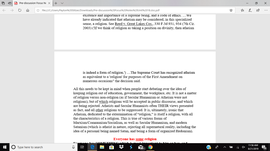UPDATE on Religion's professor saying atheism is a religion.
I've been asked so many times for clarification on what my religions professor said. Here's notes from his lectures he sends out. Also, yes, he is a Lutheran minister....and he has essentially ditched our textbook (which I liked) and everything is off of his lectures/notes.
In addition, in our papers we're only allowed to use sources that he has given us in advance so that doesn't allow for any opposing research to be included in our papers. It's not a huge deal, but it's just a tiny bit disappointing.



Enjoy being online again!
Welcome to the community of good people who base their values on evidence and appreciate civil discourse - the social network you will enjoy.Create your free account
53 comments (51 - 53)
Feel free to reply to any comment by clicking the "Reply" button.Not sure what gives this dude the right to tell others what they believe or don't believe. Or to define another person's religion for them. Don't generally pay much attention to folks like that.
Thanks Piper...you might want to read the whole Circuit Court opinion (Kaufman v. McCaughtry, 419 F.3d 678 (7th Cir., 2005) to understand where he is coming from. In order for a prison (state or federal institution) to be "neutral" as to religious beliefs it has to classify atheism as a religion. Here is a quote from the case defining "religion:"
"The Supreme Court has said that a religion, for purposes of the First Amendment, is distinct from a "way of life," even if that way of life is inspired by philosophical beliefs or other secular concerns. See Wisconsin v. Yoder, 406 U.S. 205, 215-16, 92 S.Ct. 1526, 32 L.Ed.2d 15 (1972). A religion need not be based on a belief in the existence of a supreme being (or beings, for polytheistic faiths), see Torcaso v. Watkins, 367 U.S. 488, 495 & n. 11, 81" ...
"The Supreme Court has recognized atheism as equivalent to a "religion" for purposes of the First Amendment on numerous occasions, most recently in McCreary County, Ky. v. American Civil Liberties Union of Ky., U.S. , 125 S.Ct. 2722, L.Ed.2d (2005). The Establishment Clause itself says only that "Congress shall make no law respecting an establishment of religion," but the Court understands the reference to religion to include what it often calls "nonreligion." In McCreary County, it described the touchstone of Establishment Clause analysis as "the principle that the First Amendment mandates government neutrality between religion and religion, and between religion and nonreligion." Id. at *10 (internal quotations omitted).
So yes, since everyone has a way of life, atheism, under the First Amendment is a religion, so as not to discriminate against non-believers. And in double speak, non-religion equals religion.
Perhaps once some of the previous commentators read the court's definition they will see that your prof is teaching the "legal" definition. The fact that you can only use his sources is b.s. of course, especially if he didnt even give you the citation to the case he used, so you can read it in context.
Enjoy being online again!
Welcome to the community of good people who base their values on evidence and appreciate civil discourse - the social network you will enjoy.Create your free account
Share this post
Categories
Agnostic does not evaluate or guarantee the accuracy of any content. Read full disclaimer.






